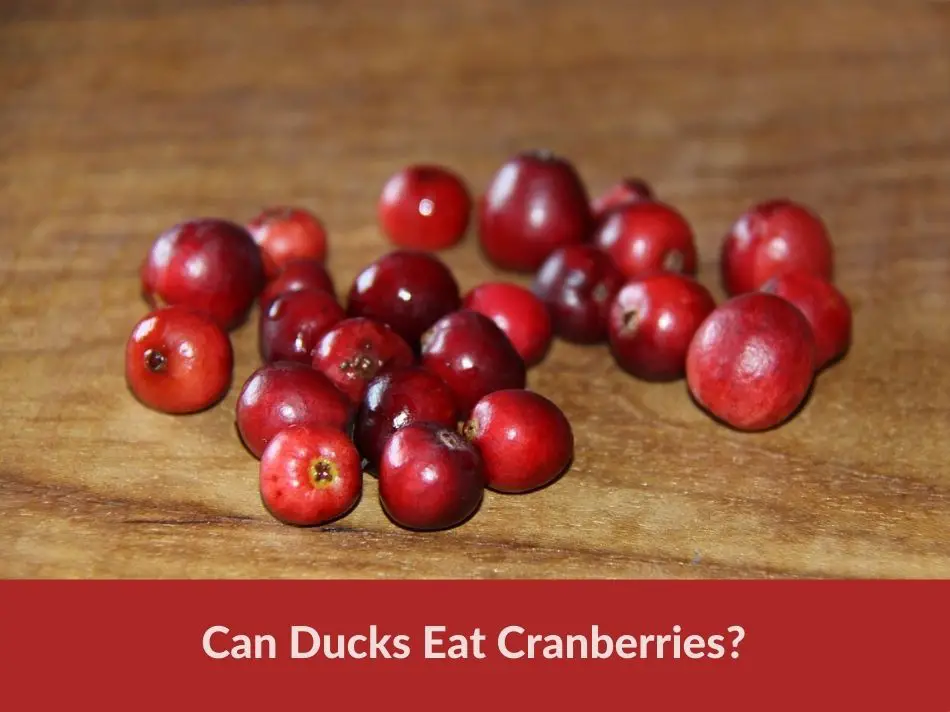Ducks are omnivorous creatures, boasting a diverse diet that includes aquatic plants, insects, small fish, and various seeds. In natural settings, ducks skillfully forage for their food, dabbling in water to catch tiny creatures or to grab seeds and plants. But, can ducks eat cranberries?
Yes, ducks can safely eat cranberries. Cranberries are rich in vitamins, minerals, and antioxidants, cranberries can offer ducks a tasty treat that diverges from their regular diet.
In this article, we will discuss the suitability of cranberries as a treat for ducks, touching on their natural diet, the ideal feeding frequency for cranberries, and potential health considerations for ducklings.
How Often Can I Feed My Ducks Cranberries?
Cranberries, like other treats, should be provided to ducks in moderation. Once a week should be enough for this treat. They shouldn’t replace the primary dietary components that ducks rely on for their nutritional needs.
Given their sugar content, excessive consumption might lead to potential health issues, such as loose stools.
Can Ducklings Eat Cranberries?
Ducklings, while adorable, have more sensitive dietary requirements compared to mature ducks. During their initial weeks, they primarily rely on starter feeds formulated to offer them the essential nutrients for growth.
Introducing cranberries to ducklings is not strictly harmful, but it is advised to wait until they are a bit older and have a more established diet.
Are Cranberries Healthy For Ducks?
Cranberries, predominantly associated with human dietary intake, also encompass nutritional components that can benefit ducks when introduced appropriately into their diet.
Here’s a comprehensive examination of the nutritional attributes of cranberries and their potential impact on ducks:
- Vitamins and Minerals: Cranberries are vitamin-rich, containing notable amounts of vitamin C and vitamin E. Vitamin C plays a role in collagen synthesis, essential for maintaining the health of skin, ligaments, and blood vessels, even in ducks. On the other hand, vitamin E acts as a potent antioxidant, helping to safeguard cells from the harmful effects of free radicals. Besides these, cranberries also offer a decent amount of vitamin K and several B vitamins.
- Antioxidants:Perhaps one of the most touted benefits of cranberries is their antioxidant content. These naturally occurring compounds help combat oxidative stress in the body. For ducks, oxidative stress can result from various factors such as environmental pollutants or natural metabolic processes. Introducing foods high in antioxidants, like cranberries, can help bolster their natural defenses.
- Dietary Fiber: Fiber plays a crucial role in digestion, aiding in the movement of food through the digestive tract and ensuring optimal nutrient absorption. Cranberries contain a fair amount of dietary fiber, which can support digestive health in ducks, leading to healthier and more regular bowel movements.
- Natural Sugars: While cranberries do contain sugars, they’re natural and not processed, meaning they don’t bring along the harmful effects associated with refined sugars. These natural sugars can provide ducks with a quick energy source. Yet, it’s worth noting that excessive sugar, even from natural sources, can pose health risks, making moderation key.
- Flavonoids and Phytonutrients: These compounds, present in many fruits, including cranberries, possess anti-inflammatory and antioxidant properties. They can contribute to overall health and may help in combating some diseases.
- Water Content: Being a fruit, cranberries naturally have a high water content. This is beneficial as it contributes to hydration. For ducks that may not always drink enough water, foods with higher water content can supplement their hydration needs.
- Trace Elements: Cranberries also contain trace amounts of essential minerals like manganese, which is vital for enzyme function, and copper, necessary for several physiological processes.
How To Feed Cranberries To Ducks
Feeding ducks is more than just tossing treats their way. When it comes to cranberries, here’s a list of instructions to ensure that they’re introduced into the duck’s diet safely:
- Choose Natural Over Processed: Always opt for fresh or frozen cranberries. Avoid cranberries that have been dried with added sugars or those that are part of sugary snacks or pastries.
- Wash Thoroughly: Like any other fruit, it’s crucial to wash cranberries before feeding them to ducks to remove any residual pesticides or contaminants.
- Mash or Crush the Berries: To make it easier for ducks to consume, slightly mash or crush the cranberries. This not only eases consumption but also aids in digestion.
- Limit Quantities: Treat cranberries as an occasional treat, not a primary food source. Introduce them gradually and observe the ducks for any changes in behavior or stool consistency.
- Always Provide Water: When feeding cranberries or any other food, always make sure ducks have access to clean water. They often like to drink when they eat, and water helps in the digestion process.
More Berries Ducks Can Eat
In addition to the berries you’ve provided, ducks can safely enjoy a diverse range of berries as treats. Berries are often rich in antioxidants, vitamins, and other essential nutrients that can be beneficial for ducks.
Here are some more berries ducks can eat:
Be sure to explore our list of berries suitable for ducks.
Conclusion
In summary, cranberries can make a tasty and nutritious treat for ducks. By observing moderation and preparing the berries appropriately, duck keepers can introduce a new flavor profile to their flocks while also providing them with an array of health benefits.
As always, it’s imperative to monitor ducks when introducing any new food and to consult with a veterinarian or avian specialist if any concerns arise.
Disclaimer: The information in this article is for informational purposes only. I'm not an expert or a veterinarian.


